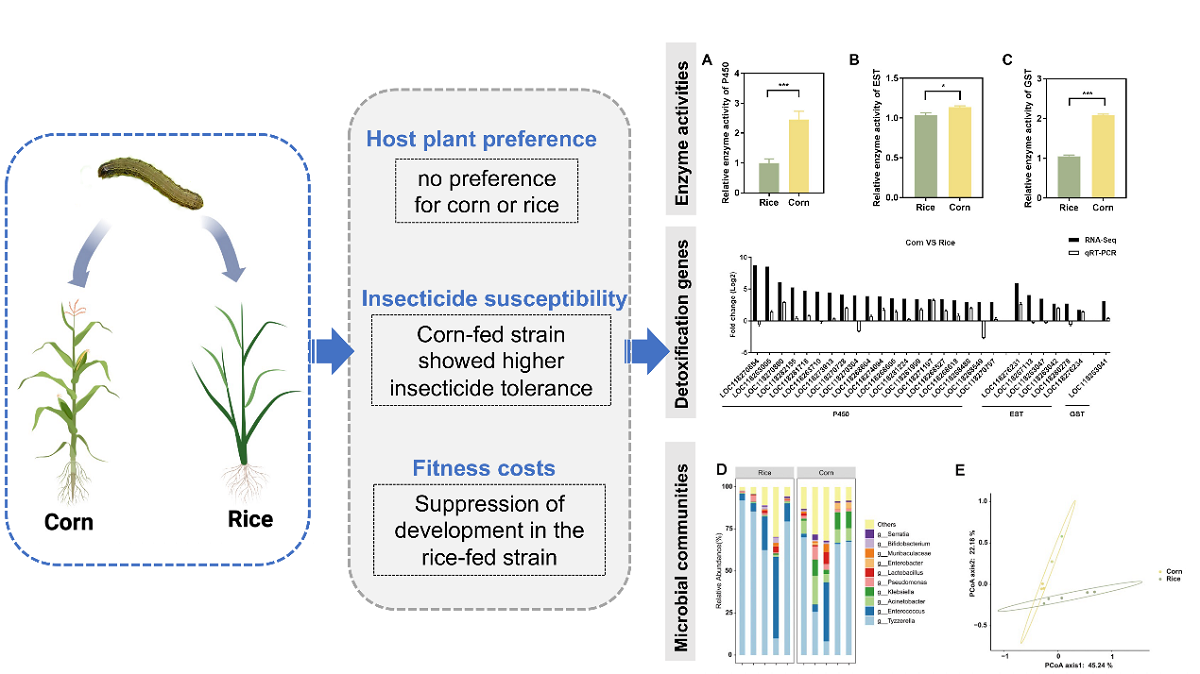南湖新闻网讯(通讯员 郭志敏)近日,我校植物科学技术学院李建洪教授带领的农药毒理学与有害生物抗药性团队研究成果以“Insecticide susceptibility and mechanism of Spodoptera frugiperda on different host plants”为题在Journal of Agricultural and Food Chemistry上在线发表。研究团队利用生物化学、分子生物学等多种方法,探究了重大入侵害虫草地贪夜蛾取食不同寄主植物后杀虫剂敏感性差异机制,揭示了寄主植物影响草地贪夜蛾杀虫剂敏感性的分子机制。
草地贪夜蛾(Spodoptera frugiperda)是联合国粮农组织(FAO)全球预警的迁飞性重大农业害虫,自2018年12月由缅甸入侵我国云南省后迅速蔓延,对我国粮食安全生产造成严重威胁。草地贪夜蛾寄主范围广泛,根据寄主植物偏好性不同分为“玉米型”和“水稻型”。尽管早期研究发现入侵我国的草地贪夜蛾主要为玉米型,但仍有为害水稻和其他农作物的现象存在。目前草地贪夜蛾的防控主要依赖于化学防治,但杀虫剂大量使用导致的抗药性问题不容忽视。因此,明确草地贪夜蛾在不同寄主植物上的抗性发展趋势对草地贪夜蛾的高质量防控具有重要意义。

不同寄主饲养的草地贪夜蛾品系药剂敏感性差异的分子机制
研究人员以田间“玉米型”草地贪夜蛾种群为初始种群,在室内条件下分别使用水稻和玉米连续饲养13代,构建了取食水稻(水稻品系)和玉米(玉米品系)的两个草地贪夜蛾品系,深入探究了两个品系草地贪夜蛾对常用防治药剂的敏感性差异机制。结果表明连续用水稻饲养并不能改变草地贪夜蛾的寄主型,但与玉米品系相比,水稻品系对氯虫苯甲酰胺、茚虫威、高效氯氟氰菊酯等防治药剂的敏感性更高。解毒酶活力测定结果表明,水稻品系草地贪夜蛾的解毒酶(P450、EST、GST)活力显著低于玉米品系,说明杀虫剂解毒代谢能力的不同是导致药剂敏感性差异的重要原因。研究人员进一步通过RNA-Seq、RNAi等实验鉴定出一个介导药剂敏感性差异的关键P450基因(LOC118271197)。进一步基于微生物组测序、抗生素处理和寄主转换等实验证实共生菌在不同寄主草地贪夜蛾杀虫剂解毒代谢中起重要调控作用。
该研究表明,尽管“玉米型”草地贪夜蛾具备为害水稻的风险,但由于其对水稻的适应性较低,在水稻上对杀虫剂的敏感性较高,因此使用化学杀虫剂仍能对其进行有效防治。研究结果为针对不同寄主作物设计草地贪夜蛾防治策略奠定了理论基础。
植物科学技术学院博士研究生郭志敏和已毕业博士研究生金若珩为该论文共同第一作者,马康生副教授为论文通讯作者,李建洪教授、万虎副教授和何顺副教授参与了项目的指导。该研究得到湖北省重点研发计划(2020BBA051)和湖北省科技创新行动项目(NYKJ2019011)的资助。
审核人:李建洪
【英文摘要】
Spodoptera frugiperda (J. E. Smith) is a worldwide economically important crop pest. Although the individuals of S. frugiperda that invaded China have been characterized as the corn strain, they also have the ability to damage other crops in China. The physiological and behavioral responses of S. frugiperda to different host plants are poorly understood. In the present study, we investigated the host plant preference, fitness costs, and differences in detoxification gene expression and microbiome composition between two S. frugiperda strains that fed on different crop plant diets. The results showed that S. frugiperda larvae exhibited no obvious preference for corn or rice, but significant suppression of development was observed in the rice-fed strain. In addition, the corn-fed strain showed higher insecticide tolerance and detoxification enzyme activities than the rice-fed strain. Moreover, multiple detoxification genes were upregulated in the corn-fed strain, and microbiome composition variation was observed between the two strains. Together, the results suggest that population-specific plasticity is related to host plant diets in S. frugiperda. These results provide a theoretical basis for the evolution of resistance differences in S. frugiperda and are helpful for designing resistance management strategies for S. frugiperda aimed at different crops.
论文链接:https://pubs.acs.org/doi/full/10.1021/acs.jafc.2c04189